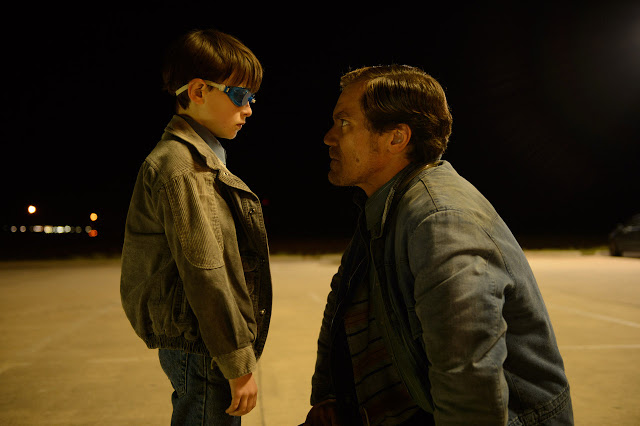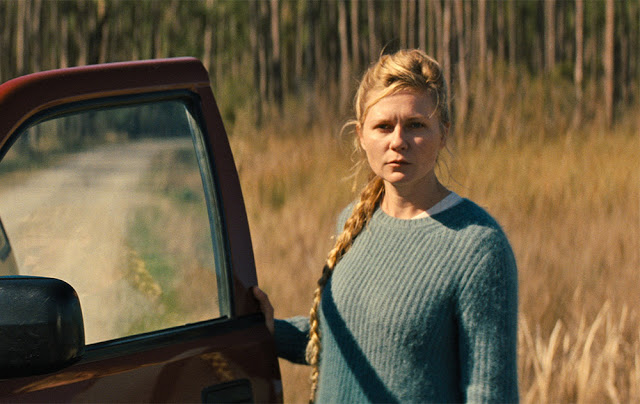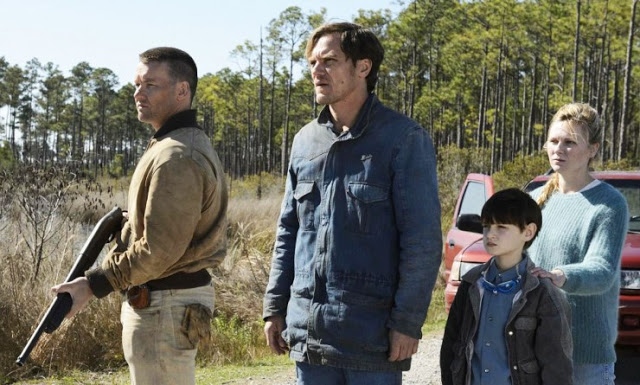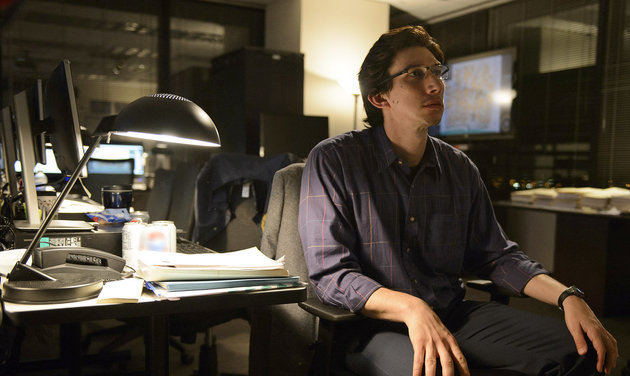Alton Meyer is a strange boy. His nature and purpose are a subject of fierce dispute—some view him as the messiah, others as a danger—but there is no disputing his oddness. He has visions. He speaks in tongues. He has a knack for randomly uttering classified government information. And every so often, beams of bright blue light emanate from his eyes. This is not your typical eight-year-old.
And Midnight Special, the fourth film from writer-director Jeff Nichols, is not your typical movie. Exactly what it is, however, is harder to determine. Is it a science-fiction thriller? A magical fairytale? A parable of governmental interference? An admonition of cultish groupthink? Midnight Special carries hints of all of these, and its fractured, enigmatic identity is both tantalizing and, ultimately, dissatisfying. Its pieces are all strong—solid acting, impressive craft, moments of raw power—but it is so resistant to coherence that those pieces just sit in isolation, never coalescing into a compelling whole. It refuses to conform and ends up just being formless.
This sort of dissonance is nothing new for Nichols. His prior film, Mud, disguised itself as a noirish potboiler but worked far better as a clandestine coming-of-age story. Before that, he made Take Shelter, a fascinating, frustrating study of paranoia and mental illness. (I have not seen his debut, Shotgun Stories.) He likes to mess around with genre, to operate within traditional filmmaking landscapes while simultaneously distorting them into something new. In this sense, Midnight Special is both Nichols’s most ambitious and his most conventional movie to date. In many ways, it is a familiar slice of Spielbergian wonder, featuring aliens, a precious child, shadowy government agencies, and a beat-the-clock journey. But it is also an oblique, unhurried meditation on family and humanity, the kind of placid film that sports numerous shots of people staring pensively into the distance.
This curious amalgam doesn’t make Midnight Special especially good, but it does make it interesting, especially in its early stages, when it washes over you with its angular peculiarity. Alton (Jaeden Lieberher), who has spent his youth on a Texas ranch, has been liberated (kidnapped?) by his father, Roy (Michael Shannon, working with Nichols for the third time), and Roy’s childhood friend, Lucas (Joel Edgerton, as well-built as he is reliable). They’re desperate to spirit Alton to an undisclosed location in a few days’ time, though they’re being pursued both by the police (an amber alert has been issued) and by a pair of taciturn underlings who work for the ranch’s leader. That would be Calvin (Sam Shepard, whose mere presence lends the film a hint of gravitas), a soft-spoken preacher who has tailored his sermons based on Alton’s purported visions. This has attracted the attention of Paul Sevier (Adam Driver), an inquisitive NSA agent who suggests that Alton’s mysterious spoutings of numbers contain secret data, meaning that Alton is less savior than security risk.
Got it? I didn’t think so. But the theory of Midnight Special is that your struggle to comprehend its plot is thought-provoking rather than maddening. Thus, while it follows the standard template of the chase movie—Alton’s escape leads to a series of suspenseful encounters with law enforcement, Calvin’s henchmen, and assorted third parties—Nichols shows minimal interest in elucidating the film’s story. He’s more concerned with demonstrating Alton’s effect on others, and exploring how we grounded humans might react to something beyond our comprehension. Alton occasionally exhibits the characteristics of both an alien (seriously, what is up with those eyes?) and a vampire (he struggles with sunlight), and his indisputable otherworldliness produces an intriguing spectrum of reactions and behavior. Calvin is convinced that the boy can lead his flock to the promised land, but he countenances terrible measures to return Alton to the ranch. Paul is at first more wary than awed, though he grows to accept Alton’s presence as benign and perhaps divine. And Roy—along with Alton’s mother, Sarah (Kirsten Dunst, doing a lot with little)—just wants to help his son, regardless of his eccentricities.
Nichols’s intent—one might say his intelligent design—is to use Alton as a looking glass; when we gaze at him, we are supposed to confront our own entrenched stances on family, devotion, and faith. It’s a lofty goal, but the problem with Midnight Special is that it mistakes ambiguity for wonder. In order to properly grapple with the questions that this movie attempts to pose, we need to be drawn into its universe, to find astonishment in its depictions of the mystical. Yet Nichols’s insistent refusal to clarify the film’s meat-and-potatoes elements inadvertently keeps us at a distance. He wants us to engage, but he repeatedly shuts us out. It is difficult to access a film that continuously walls itself in.
This is disappointing, especially because many individual scenes in Midnight Special are flat-out terrific. The film invites obvious comparisons with both E.T. and Close Encounters of the Third Kind, and while Nichols is no Spielberg as a visualist, he possesses a confident command behind the camera. This is most evident in Julie Monroe’s editing; many scenes end a touch before you expect them to, resulting in a frisson of uncertainty. And while the movie is briskly paced, Nichols can also exercise patience, and a handful of quiet moments—a sunrise, a shooting’s aftermath, a shot of Dunst silently looking at herself in the mirror—achieve something close to majesty. This gentle grandeur helps compensate for an oddly sloppy screenplay that’s plagued with halfhearted explanations and plentiful contrivances. At one point, a character studies a series of coordinates on a whiteboard, then suddenly exclaims, “I know where he’s going!” without bothering to explain how he arrived at this knowledge. Later, Roy and Alton barrel through what has to be the feeblest roadblock the American military has ever constructed.
Perhaps I’m being too literal in complaining about such trivial things as plot and storytelling, when Midnight Special really wants to be a mystery, a stimulus for self-reflection and the contemplation of spirituality. In other words, it’s a movie about faith. Several characters may try to kill one another, but they all have faith in Alton, and they’re convinced that they’re ultimately doing the right thing for the right reasons. Nichols is trying to do the right thing—make original, challenging films that fuse down-and-dirty action with high-concept philosophy—but he’s going about it the wrong way. Still, I have faith in him, and I remain confident that he’ll eventually be able to reconcile the warring impulses within him and produce something truly great, rather than something so exasperatingly opaque. Midnight Special confirms that Nichols can be a superior director. It also confirms that he needs to start making better movies.
Jeremy Beck is the editor-in-chief of MovieManifesto. He watches more movies and television than he probably should.




